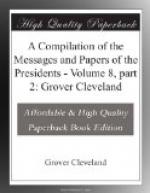Now, therefore, I, Millard Fillmore, President of the United States of America, do hereby declare and proclaim that so much of the several acts imposing discriminating duties of tonnage and impost within the United States are and shall be suspended and discontinued so far as respects the vessels of Chile and the produce, manufactures, and merchandise imported into the United States in the same from Chile and from any other foreign country whatever, the said suspension to take effect from the day above mentioned and to continue thenceforward so long as the reciprocal exemption of the vessels of the United States and the produce, manufactures, and merchandise imported into Chile in the same, as aforesaid, shall be continued on the part of the Government of Chile.
Given under my hand, at the city of Washington, this 1st day of November, A.D. 1850, and the seventy-fifth of the Independence of the United States.
MILLARD FILLMORE.
By the President:
W.S. DERRICK,
Acting Secretary of State.
FIRST ANNUAL MESSAGE.
WASHINGTON, December 2, 1850.
Fellow-Citizens of the Senate and of the House of Representatives:
Being suddenly called in the midst of the last session of Congress by a painful dispensation of Divine Providence to the responsible station which I now hold, I contented myself with such communications to the legislature as the exigency of the moment seemed to require. The country was shrouded in mourning for the loss of its venerable Chief Magistrate and all hearts were penetrated with grief. Neither the time nor the occasion appeared to require or to justify on my part any general expression of political opinions or any announcement of the principles which would govern me in the discharge of the duties to the performance of which I had been so unexpectedly called. I trust, therefore, that it may not be deemed inappropriate if I avail myself of this opportunity of the reassembling of Congress to make known my sentiments in a general manner in regard to the policy which ought to be pursued by the Government both in its intercourse with foreign nations and its management and administration of internal affairs.
Nations, like individuals in a state of nature, are equal and independent, possessing certain rights and owing certain duties to each other, arising from their necessary and unavoidable relations; which rights and duties there is no common human authority to protect and enforce. Still, they are rights and duties, binding in morals, in conscience, and in honor, although there is no tribunal to which an injured party can appeal but the disinterested judgment of mankind, and ultimately the arbitrament of the sword.




